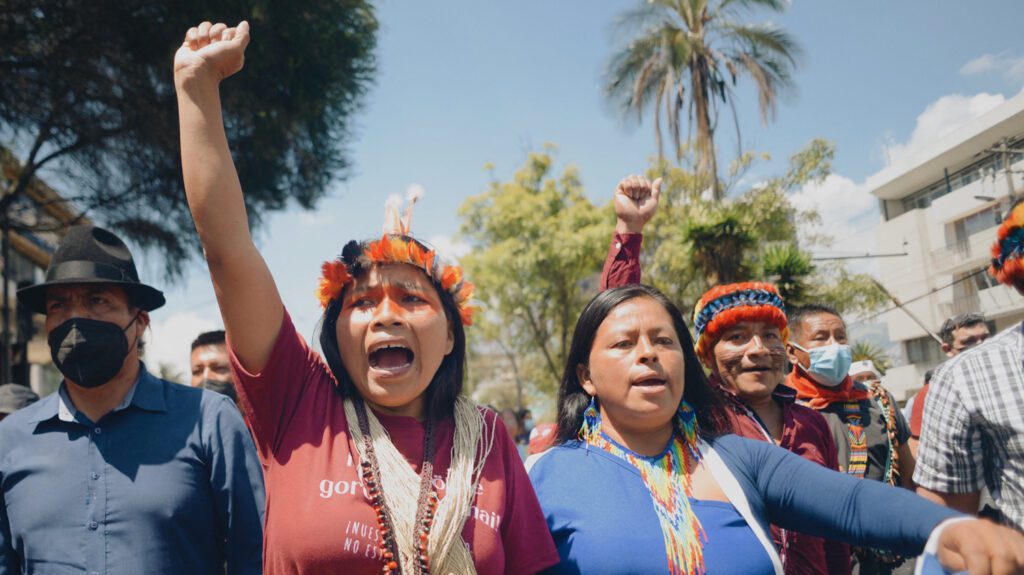A historic ruling by Ecuador’s highest court could set a precedent for Indigenous land rights around the world.
The Constitutional Court of Ecuador recognizes the right of Indigenous communities to have the final say when it comes to oil, mining, and other extractive projects that could negatively impact their land, livelihoods, and quality of life.
Central to the ruling is the concept of Free, Prior, and Informed Consent. This is recognized by the United Nations Declaration on the Rights of Indigenous Peoples (UNDRIP) and embedded in the universal right to self-determination.
According to the UN’s Food and Agriculture organization, this means Indigenous peoples can give, withhold, or withdraw their consent to any project that will affect them or their territories. It also enables communities to negotiate the conditions under which a project will be carried out.
The case was brought by the A’i Kofán community of Sinangoe, who inhabit territory from the northern Ecuadorian Amazon to southern Columbia’s river Guamués. The Kofán are backed by Amazon Frontlines, a nonprofit NGO dedicated to supporting Indigenous struggles.
Today, the Kofán people live in significantly reduced numbers in a significantly reduced territory. Oil extraction has contaminated large sections of their land and rivers, and many people experience oil-related health problems caused by toxic heavy metals and hydrocarbons.
The ruling follows years of campaigning from communities hurt by the illegal gold mining permitted by the Ecuadorian government, and confirms a 2018 ruling of the lower court on the same. Indigenous land rights were enshrined in law already; but so far, reality has failed to reflect this.

Indigenous stewardship and environmentalism
Around the world, the climate crisis is worsening, carbon stores are vanishing, and biodiversity is falling. It’s no coincidence that the dispossession and violence of colonialism has had a significant negative impact on the natural world as well as the humans within it.
This connection is just one of the reasons that rulings such as this one are important, both for Indigenous land sovereignty and the protection of the environment in general. The court case reflects countless struggles for recognition, autonomy, and freedom from destructive and exploitative industry practices.
Overall, Indigenous territories cover approximately 22 percent of the planet’s surface, hold 17 percent of all forest-stored carbon, and safeguard around 80 percent of all biodiversity. Multiple studies also repeatedly indicate that Native-managed land is both healthier and more biodiverse.
“Indigenous peoples have protected their lands and forests from the kind of natural resource extraction that is fueling the climate crisis,” explains Kate Horner, the Acting Director of Amazon Frontlines. “Their efforts need to be supported if we are to have any hope of a safe climate future.”
Ecuadorian court recognizes land rights of Indigenous peoples’
Fundamentally, this judgement confirms that the Ecuadorian state must pursue and obtain consent from all affected people before they undertake or permit any extractive projects, something that governments around the world have frequently failed to do.
While the Ecuadorian state will still be able to move forward with extraction permissions under exceptional circumstances, the ruling states: “under no circumstances can a project be carried out that generates excessive sacrifices to the collective rights of communities and nature.”
The court’s decision will apply to all 14 of Ecuador’s recognized Indigenous communities, including approximately 70 percent of the Ecuadorian Amazon—a particularly mineral-rich part of the country. Furthermore, activists suggest that this moment could have a positive knock-on effect felt in Indigenous communities—and courtrooms—around the world.
“This is a very important ruling for our community and others that face similar problems,” says Wider Waramag, a leader with the A’i Kofán community of Sinangoe.
“This decision is an enormous victory for Sinangoe and to now have a legal instrument that guarantees the rights to our communities, where there needs to be a historical precedent of free, prior and informed consent within the national territory, demonstrates the power of unity.”

Ecuadorian communities fighting extraction projects
Just last week, a pipeline leaked around 6,300 barrels of oil into a natural reserve in a protected part of the Ecuadorian Amazon. This pollution will have a devastating impact on the area’s residents, flora, and fauna for years to come, as shown by a similar disaster in 2020.
Ecuadorian President Guillermo Lasso had previously planned to double oil production and expand mining operations over the next few years, as detailed in his Executive Decree 95 and 151, respectively. However, he will likely be hampered by the supreme court’s ruling.
Ecuador produces a little over 500,000 barrels of oil per day but ranks 19th worldwide in terms of its proven overall reserves. In contrast to Lasso’s plans for expansion, there has been little state investment in the Amazon provinces which are home to the bulk of Ecuador’s oil.
The next case regarding Indigenous Ecuadorians’ right to consent will see Pastaza’s Waorani community offer oral arguments to the Constitutional Court against the government’s auctioning of ancestral lands to oil companies for drilling and extraction.


